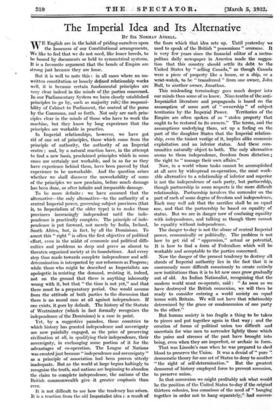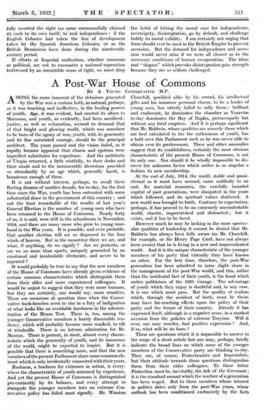The Imperial Idea and Its Alternative
By SIR NORMAN ANGELL.
TATE English are in the habit of priding ourselves upon the looseness of our Constitutional arrangements. We like to feel that we do not need, hie lesser breeds, to be bound by documents or held to symmetrical systems. It is a favourite argument that the bonds of Empire are strong just because they are loose.
But it is well to note this : in all eases where an un- written constitution or loosely defined relationship works well, it is because certain fundamental principles are very clear indeed in-the minds of ,the parties concerned. In our Parliamentary Syslean we have clearly established principles to go by, such as majority rule;.the responsi- bility of Cabinet to Parliament, the control of the purse by the Commons, and so forth. Not only are such prin- ciples clear in the minds of those who have to work the machine, but they know by long experience that the principles are workable in practice.
In Imperial relationships, however, we have got rid of one set of principles, those which come from the principle of authority, the authority of an Imperial centre ; and, by a natural reaction have, in the attempt to find a new basis, proclaimed principles which in some cases are certainly not workable, and in so far as they have experience behind them, have been proved by that experience to be unworkable. And the question arises whether we shall discover the unworkability of some of the principles we now proclaim, before much damage has been done, or after infinite and irreparable damage.
To be more definite : we have assumed that the alternative—the only alternative—to the authority of a central Imperial power, governing subject provinces (that is, to Imperialism of the older type) is to make those provinces increasingly independent until the inde- pendence is practically complete. The principle of inde, pendence is put forward, not merely by India, Ireland, South Africa, but, in fact, by all the Dominions. To assert this " right " is often the first objective of political ' effort, even in the midst of economic and political diffi- culties and problems so deep and grave as almost to threaten organized society at its foundations. And every step thus made towards complete independence and self- determination is interpreted by our reformers as Progress; while those who might be described as Imperialists are apologetic in resisting the demand, resisting it, indeed, not on the ground that there is anything inherently wrong with it, but that "the time is not yet," and that there must be a preparatory period. One would assume from the attitude of both parties to the discussion that there is no moral case at all against independence. If one exists, it goes by default. The history of the Statute of Westminster (which in fact formally recognizes the independence of the Dominions) is a case in point.
Yet, by a suggestive paradox, those countries to which history has granted independence and sovereignty are now painfully engaged, as the price of preserving civilization at all, in qualifying their independence, their sovereignty, in exchanging some portion of it for the advantages of co-operation. The League of Nations was created just because "independence and sovereignty" as a principle of association had been proven utterly inadequate. But as the world at large begins haltingly to recognize the truth, and nations are beginning to abandon the claim to complete independence, the nations of the British commonwealth give it greater emphasis than ever.
It is not difficult to see how the tendency has arisen. It is a reaction from the old Imperialist idea a result of
the fears which that idea sets up. Until yesterday we used to speak of the British " possessions " overseas. It is very few years since the financial editor of a metro- politan daily newspaper in America made the sugges- tion that this country should settle its debt to the United States by "telling Canada," as though Canada were a piece of property like a house, or a ship, or a wrist-watch, to be " transferred " from one owner, John Bull, to another owner, Jonathan.
This misleading terminology goes much deeper into
our minds than some of us know, Nine:tenths of the anti- Imperialist literature and propaganda is based on the assumption of some sort of " ownership " of subject
territories' by the Imperial Power. Territories of the Empire are often spoken of as "stolen property that ought to be restored to its owners." The terms, and the assumptions underlying them, set up a feeling on the part of the daughter States that the Imperial relation- ship, even the tiniest vestige of it, implies alike economic exploitation and an inferior status. And these com- munities naturally object to both. The only alternative seems to them independence, freedom from dictation ; the right to "manage their own affairs."
Now, in a world whose tasks cannot be accomplished at all save by widespread co-operation, the most work- 3bIc alternative to a relationship of inferior and superior is not the independence of each party, but partnership, though partnership in some respects is the more difficult relationship. Partnership involves the surrender on the part of each of some degree of freedom and independence. Each may well ask that the sacrifice shall be an equal one, and that the partnership be based on equality of status. But we are in danger now of confusing equality with independence, and talking as though there cannot be equality without independence.
The danger to-day is not the abuse of central Imperial power, economically or politically. The problem is not how to get rid of "oppression," actual or potential. It is how to find a form of Federalism which will be workable and acceptable to the parties concerned.
• Now the danger of the present tendency to destroy all shreds of Imperial authority lies in the fact that it is enormously more difficult consciously to create entirely new institutions than it is to let new ones grow gradually out of old. An Indian Nationalist, recognizing that the modern world must co-operate, said : "As soon as we have destroyed the British connexion, we will then be ready to consider entering a world society on equal terms with Britain. We will not have that relationship determined by the grace or condescension of one party to the other."
But human society is too fragile a thing to be taken to pieces and put together again in that way ; and the creation of forms of political union too difficult and uncertain for wise men to surrender lightly those which the pains and stresses of the past have brought into being, even when they are imperfect, or archaic in form.
That was Lincoln's case when he was prepared to shed blood to preserve the Union. It was a denial of" pure ". democratic theory for one set of States to deny to another "the right of self-determination." But the greatest democrat of history employed force to prevent secession, to preserve union.
In that connexion we might profitably ask what would be the position of the United States to-day if the original thirteen colonies, less conscious of the need of" hanging together in order not- to hang separately had success-
fully asserted the right (as some unsuccessfully claimed it) each to its own tariff, to real independence: if the English Colonies had taken the line of development taken by the Spanish American Colonies, or as the British Dominions have done during the nineteenth- century period.
If efforts at Imperial unification, whether economic or political, are not to encounter a national separatism buttressed by an irresistible sense of right, we must drop the habit of letting the moral case for independence, sovereignty, disintegration, go by default, and challenge boldly its moral validity. I am certainly not urging that force should ever be used in the British Empire to prevent secession. But the demand for independence and seces- sion would never arise if we were all clearer as to the necessary conditions of human co-operation. The ideas and "slogans" which provoke disintegration gain strength because they arc so seldom challenged.



















































 Previous page
Previous page